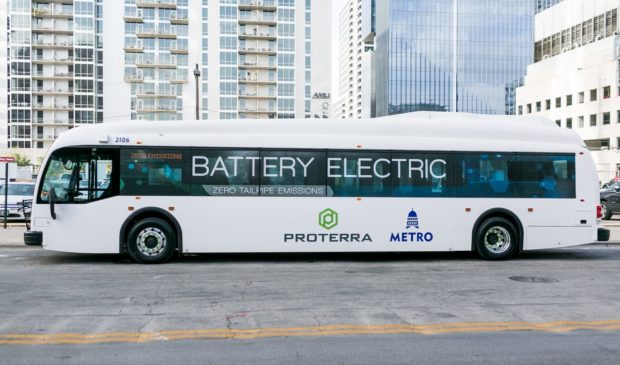Capital Metro to buy last wave of diesel, first electric buses
Tuesday, April 23, 2019 by
Ryan Thornton In line with its overarching vision for Project Connect, the Capital Metropolitan Transportation Authority is hoping to phase out use of diesel engine buses beginning this year with the purchase of at least four battery electric buses.
The agency has been planning to have electric buses on the streets in Fiscal Year 2022, but now feels “more ready for electric buses” than it had expected, Dottie Watkins, vice president of bus operations, said during Monday’s board of directors meeting.
Following the board’s unanimous vote on a contract with Proterra Inc., the agency now plans to have two electric buses in service by the end of 2019, with two more joining the fleet in early 2020.
The agency will be purchasing the four Proterra electric buses at a cost of $1,069,476 each with money available in the Fiscal Year 2020 Capital Improvement Plan. The agency has also applied for a federal grant that would allow for the purchase of six additional electric buses.
The board also approved a contract with Gillig LLC on Monday for between 23 and 29 new “clean diesel” buses (depending on grant funding) which, in conjunction with the electric buses, will satisfy Capital Metro’s target of replacing 33 of its oldest buses in Fiscal Year 2020.
In contrast to the buses being removed from the agency’s fleet, which are approaching 18 or more years of service, Watkins said the new diesel buses feature a variety of technological components to make them “as clean as you can possibly make a diesel bus.”
Watkins said the agency has chosen to purchase the buses through a cooperative contract with the state of Virginia, allowing it to speed up the procurement process and begin planning for the next five years without making further commitments to non-electric buses.
“It is our hope that these may be the last diesel buses that we purchase,” Watkins said.
As Board Member Eric Stratton of Williamson County noted Monday, at $536,761 per vehicle, the diesel buses are both cheaper (roughly half the cost of an electric bus) and more established in the transit industry compared to the electric buses from Proterra, a company that has been manufacturing electric buses for little over a decade.
As for the novelty of the electric vehicles, CEO Randy Clarke said the agency is far from the first to make such a move. While electric buses may be somewhat rare in the United States outside of California, Clarke said globally speaking they are well-tested.
“There’s a city in China that has 15,000 of them,” Clarke said, in reference to Shenzhen, a city that fully electrified its fleet of over 16,000 buses in 2017.
Capital Metro temporarily tested one of Proterra’s electric buses, along with buses from two other manufacturers, as part of a demonstration project last summer.
While Watkins couldn’t give Stratton an exact figure on how much money the electric buses would end up saving the agency compared to diesel buses in the long run, she said that even in the worst-case scenario it would not be more expensive than diesel.
With the cost of replacement batteries and chargers built into the contract, the biggest unknown factor driving cost, Watkins said, is the rate of electricity yet to be negotiated between Capital Metro and Austin Energy. The utility is currently working with the agency on the design and infrastructure of its future smart electric bus yard, located adjacent to the agency’s North Operations Facility, at the site of an old Serta Mattress warehouse. The area is being designed with electric conduit to potentially act as a charging and storage space for nearly 200 electric buses as Capital Metro takes steps to fully electrify its fleet.
As for the rate, Karl Popham, manager of electric vehicles and emerging technologies for Austin Energy, told the Monitor that the agency will ultimately need to decide if it wants to pay a little more to maximize its environmental goals by sourcing electricity entirely from renewable energy or if it would rather pay a slightly lower rate by using the utility’s grid power, which itself is moving toward the goal of 65 percent renewable by 2027.
Regardless of its choice, Popham said, all Austin Energy customers enjoy some of the lowest energy rates in the state of Texas and also get the extra benefit of knowing the profits generated by the utility are going right back into the city coffers.
Council Member Ann Kitchen noted that any savings were in addition to the environmental and community benefits of having cleaner air and more comfortable transit rides. Clarke also pointed to the environmental justice of no longer having loud diesel buses driving through communities at all hours of the day. The electric buses, Clarke said, are “incredibly quiet.”
Photo courtesy of Capital Metro.
The Austin Monitor’s work is made possible by donations from the community. Though our reporting covers donors from time to time, we are careful to keep business and editorial efforts separate while maintaining transparency. A complete list of donors is available here, and our code of ethics is explained here.
You're a community leader
And we’re honored you look to us for serious, in-depth news. You know a strong community needs local and dedicated watchdog reporting. We’re here for you and that won’t change. Now will you take the powerful next step and support our nonprofit news organization?











